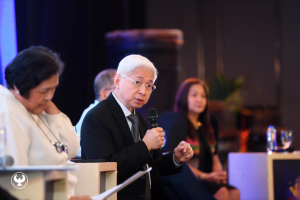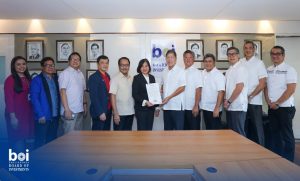MANILA, Philippines, September 11, 2020 – The Philippines concluded its Guest Country of Honor duties at the China International Fair for Investment and Trade (CIFIT) 2020 held in Xiamen, China, where the delegation – led by Ambassador Jose Santiago Sta. Romana, together with Philippine Cabinet Secretaries and top government officials – encouraged Chinese and foreign investors to make their next business move happen in the Philippines.
CIFIT 2020 kicked off with the grand opening of the Philippine National Pavilion, which drew high-ranking Chinese officials and key Chinese investors and entrepreneurs. Anchored on the theme “Partner Philippines: Building Value Together,” the pavilion enjoyed a steady stream of Chinese and foreign investors considering to make their next business move in the Philippines.
The Philippine Investment Forum was similarly well-attended by Chinese investors keen on learning more about investment opportunities in the country. Jack Jiang, General Manager of the Philippine branch of Yingke Law Firm, particularly found Trade Secretary Ramon Lopez’s presentation reassuring.
“He showed how the Philippine government is improving the investment environment. He talked about the friendship between China and the Philippines, that it will remain even after President Duterte’s tenure. That was very inspiring to hear,” shared Mr. Jiang, whose law firm is the largest in the Asia Pacific region.
Perks of investing in PH
As the Philippines’ top trading partner with which it shares a long and rich history, China is among the key viable markets for the Southeast Asian nation to tap into for more foreign investments that will contribute to job generation and help sustain economic growth and development, especially after the pandemic broke the country’s 22-year economic growth streak.
The Philippine economy recently saw a -16.5% drop in its gross domestic product at the height of a nationwide lockdown to contain the spread of COVID-19. However, the country is poised to recover quickly on the back of strong macroeconomic fundamentals, resumption of more economic activities, and a strong-willed government bent on attracting more investors to our shores, especially from neighboring China and its territories.
“As we eventually recover from the COVID-19 pandemic, the Philippines views China playing yet again an important role in its return to economic growth and expansion,” said the Philippines’ Chief Envoy, noting that CIFIT is a major step toward resuming the strong cooperation and partnership between the two Asian countries.
“The Philippine Embassy and the Philippine Trade and Investment Centers in China stand ready to extend assistance to our Chinese friends intent on establishing or expanding their business presence and investments in the Philippines,” Amb. Sta. Romana added.
Amidst the raw materials sourcing and production challenges brought about by the pandemic, Trade Sec. Lopez presented the Philippines as a complementary host country to Chinese investors’ manufacturing and services industries. “As strong linkages in the global supply chain make the Philippines an ideal hub for investment-driven export-oriented sectors, the Philippines and China can also explore strong complementation in the production of medical products and supplies, pharmaceuticals, medical devices, electronics and automotive, among other sectors within the manufacturing industry,” he said.
Further, Sec. Lopez noted that the two countries’ economic programs are complementary as both prioritize the same strategic industries like infrastructure and innovation-driven projects.
Currently, the Philippine government is forging ahead with the Build, Build, Build flagship program, considered to have a significant multiplier effect that will fuel faster economic growth. As more construction activities resume or break ground nationwide, the Philippines would need to import more steel, textile, and other basic industrial products. Chinese companies producing these commodities will find a huge, strategic market in the Philippines.
To gain more foreign partner-investors, the Philippine Congress is also pursuing the Corporate Recovery and Tax Incentives for Enterprises (CREATE) bill, which, when passed, would not only significantly reduce corporate income tax rates in the country, but also provide the President the flexibility in granting fiscal and non-fiscal incentives for high-value strategic investments. Opportunities for Chinese and foreign partners are in innovation-driven fields of automotive, aerospace, equipment manufacturing, IT, materials development, and medicine.
Making it easier for foreign investors to start a business in the Philippines is the Ease of Doing Business and Efficient Government Delivery Services Act, which shortened the issuance of permits and licenses within three to a maximum of 20 working days. The law has helped substantially improve the Philippines’ rank in the World Bank’s Doing Business Report 2020 and Philippine President Rodrigo Duterte, in his State of the Nation Address in July, even ordered the enhanced implementation of the said law.
This is great news for Chinese investors, said Mr. Jiang, who noted that many of his fellowmen are discouraged by the long business registration process in the Philippines. “Two months is a very long time for the Chinese, so we are glad that Sec. Lopez promised to accelerate it,” he said.
Finally, the Philippines’ young and skilled, well-educated, and English-proficient labor force, make it a more competitive investment destination in this side of the world.
In his keynote address in one of CIFIT’s Investment Forums, Trade Undersecretary Ceferino Rodolfo highlighted that the Philippines’s large pool of university graduates have some of the most stable wage rates in the region, at levels sometimes lower than in most of China’s industrial regions. Further, model employers who show care and commitment toward their workers are rewarded with low turn-over rate in the Philippines, only about a fourth that of China’s.
A win-win for two economies
CIFIT 2020 also featured the promotion of 64 potential projects of the various Investments Promotion Agencies of the Philippines, where Chinese investors can consider investing. These are in infrastructure, mixed-use development (operational, industrial, real estate, residential, hotel, office spaces, etc.), logistics and transportation, agriculture, energy, and tourism, with an estimated total cost of P53.4 billion.
Each of these strategic sectors had dedicated forums where Philippine officials provided more in-depth information on investment opportunities and current policies. The discussions also provided a chance for Chinese investors to interact with some of the Philippines’ biggest companies – Aboitiz Equity Ventures, BDO Unibank, Inc., Megaworld International, and the Science Park of the Philippines – to explore potential business partnerships.
China’s Hunan Province is already on track to build an industrial park in its sister province of Bulacan, where the New Manila International Airport – a flagship project under Build, Build, Build – will rise. The industrial park will host Chinese companies from Hunan who wish to expand in the Philippines. The country’s trade agreements and warm relations with various European nations and the United States offer another advantage as it serves as a bridge for Chinese companies to access the European and American markets.
BYD Auto Co. Ltd., a Chinese technology, energy, and power solutions company with a subsidiary in the Philippines, is one firm already reaping the benefits of doing businesses in the country. Benjamin Zhao, BYD’s General Manager in the Philippines, shared that his company has been working with many local government units, particularly in the implementation of the transport modernization program.
Speaking to his fellow Chinese businessmen at the Philippine Investment Forum, Mr. Zhao said that now is the time to investment in the Philippines, adding: “COVID-19 will not affect our motivation to pursue the common growth of the two economies. The mutually beneficial cooperation between the two countries will be more profound than ever, especially amidst this pandemic. We should work together and strengthen our resolve to get over this difficulty and move toward a better tomorrow.”
Indeed, 2020 has been quite challenging year but as it winds down to the last four months, Chinese and foreign investors can expect to find a more progressive, vibrant Philippines to invest in. In a post-pandemic world, the Philippines’ favorable investment climate, policy reforms, and continuing measures to sustain these developments certainly make it the next ideal business move.
MEDIA INQUIRIES:
BOI Information and Communications Division
Email Address: infocomms@boi.gov.ph
CIFIT2020 microsite: https://boi.gov.ph/cifit2020/
ABOUT:
Philippine Board of Investments (BOI)
The Philippine BOI is the lead industry development and investments promotion agency (IPA) of the Philippine Government attached to the Philippine Department of Trade and Industry (DTI).
The BOI pursues a planned, economically feasible, and practicable dispersal of globally competitive industries. It also promotes and generates investments and improves the image of the Philippines as a viable investment destination.
FOREIGN TRADE SERVICE CORPS (FTSC)
The Foreign Trade Service Corps (FTSC) is composed of Trade Representatives or Commercial Attaches
representing the Commercial Posts of the Department of Trade and Industry (DTI) around the world.
The FTSC promotes the initiatives of the DTI, specifically on trade and investment promotions, as well as trade policy in key overseas markets.
The FTSC understands that the lifeblood of international trade relies on credible information and nurtured relations among investors and businesses. We cater to this need by bringing down the physical and cultural borders of doing business across countries. This is facilitated by a wide support network of consulate offices, trade associations, special interest councils, and our government partners in the Philippines and various trading partners worldwide.
https://www.dti.gov.ph/overseas/♦
Date of Release: 14 September 2020








